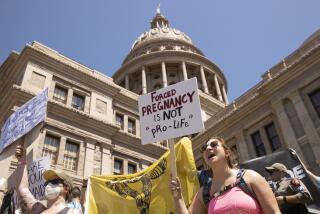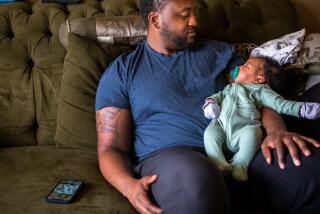To boost odds of a long life, men should delay fatherhood until age 25, study says
- Share via
Here’s some expert advice for would-be fathers: If possible, wait to have kids until you hit your mid-twenties. Becoming a parent sooner raises the chances of an early death, new research suggests.
After analyzing health records of more than 30,000 fathers from Finland, researchers determined that men who had their first child before age 22 were 26% more likely to die between the ages of 45 and 54 than men who waited until they were at least 25. The youngest fathers were about 50% more likely to die early than men who put off having kids until they were at least 30.
“Parenting can be challenging for men – especially at an early age,” said University of Helsinki sociologist Elina Einiö, leader of a team that reported the findings this week in the Journal of Epidemiology and Community Health.
The fathers in the study were a representative sample of the Finnish population and were born between 1940 and 1950. Researchers used information from Statistics Finland, a public agency, to determine the age at which each of the men became fathers and whether they died between the ages of 45 and 54.
The pattern was clear: Men who fathered children at the youngest ages were more likely to die early, regardless of other factors like their marital status, education level, total number of children and region where they lived. Men who waited until they were at least 30 to have children were the most likely to survive past middle age.
Is there something about early parenthood that takes years off a father’s life? Or is there some other social factor, like growing up in poverty, that simultaneously makes men more likely to have kids early and have health problems that increase their chances for an early death?
To address this question, the researchers combed through their group of fathers and identified nearly 12,000 men who had at least one brother. By looking at the mid-life death rates for brothers who had children at different ages, the researchers could largely rule out factors like genetic traits and early-life social experiences that could affect the age at which men have kids and their age at death.
The researchers found that the link between early fatherhood and early death was particularly strong among siblings. In this group, men who became fathers before age 22 were 73% more likely to die in middle age than their brothers who put off parenthood until at least age 25. The data suggested that men who waited until their 30s were even more likely than the 25-year-old fathers to survive middle age, but the difference wasn’t large enough to be statistically significant.
Many of the children born to the youngest fathers in the study were the result of unplanned pregnancies in the 1960s and 1970s, Einiö said. Back then, there was significant social pressure for couples to get married if they accidentally conceived a child.
“Suddenly taking on the combined role of father and breadwinner may have caused considerable psychological and economic stress for a young man,” Einiö said. “Parenting at a young age can be difficult, and it is important that other family members and health professionals recognize that not only young mothers but also young fathers may need support.”
Of the fathers who died between ages 45 and 54, the leading causes of death were heart disease (21% of deaths) and alcohol-related disease (16% of deaths).
Some of the risky behaviors that can lead to early fatherhood, such as unprotected sex and alcohol consumption, may also contribute to premature death, said Dr. Craig Garfield, a health researcher and pediatrician at Northwestern University Feinberg School of Medicine who was not involved with the study.
The finding that young fathers tend to die earlier is cause for attention in the healthcare system, he said. In the United States, young men are the least likely of any demographic group to get regular healthcare, he added.
Pediatricians who see young fathers with their babies should encourage the men to take care of their own health in addition to their new families’ well-being, Garfield said.
“There are very few things that you can do in medicine or in society that would give you as good a return in investment as making sure parents are both healthy,” Garfield said. “Thriving parents lead to thriving children.”
For more science news, follow me on Twitter @sasha_hl and “like” Los Angeles Times Science & Health on Facebook.





